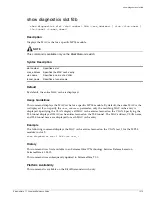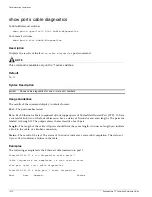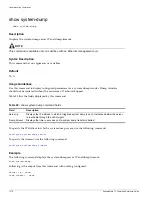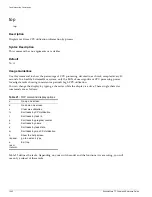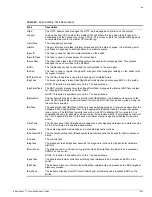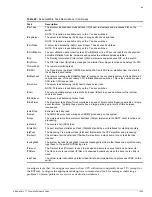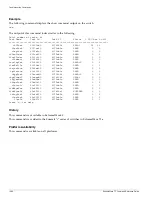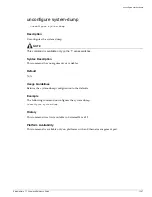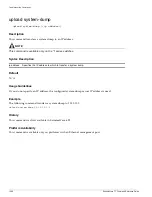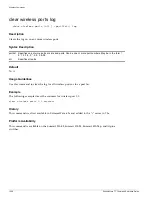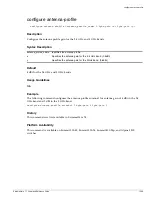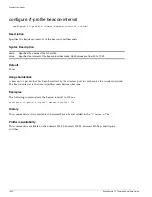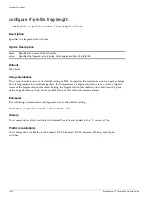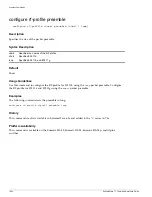
ExtremeWare 7.7 Command Reference Guide
1289
14
Wireless Commands
The Alpine switches, Summit series switches and the Altitude 300 wireless port extend network service
to wireless 802.11a/b/g clients within a fully integrated network infrastructure. Ports on the Summit
switch handle all of the management functions typically associated with an access point. The Altitude
300 wireless port serves a-s the radio transmitter and receiver, inheriting configuration information as
soon as it is attached to the switch and as changes are made to the wireless profiles after the system is
deployed.
Summary of Wireless Features
The Alpine and Summit series switches support the following wireless features:
•
Simultaneous support for 802.11a, 802.11b, and 802.11g
•
EAP authentication for 802.1X devices—Protected Extensible Authentication Protocol (PEAP), EAP
Tunneled TLS Authentication Protocol (EAP-TTLS), and Extensible Authentication Protocol
Transport Layer Security (EAP-TLS)
•
Wi-Fi Protected Access (WPA) using Temporal Key Integrity Protocol (TKIP) and Advanced
Encryption Standard (AES)
•
Per-user VLAN classification
•
AccessAdapt™ management
•
Remote troubleshooting
•
Easy upgrading of wireless ports
•
Detailed reports and logging
Wireless Devices
You configure ports on the Summit or Alpine switch with the “personality” of the device to be
connected. Each port contains separately configurable interfaces for each of its two radios (a and g).
Physical security for the wireless networks ceases to be a problem at the wireless access location
because the Altitude 300 wireless port does not store any security settings. Information is not stored in
the Altitude 300 wireless port, but loaded as needed from the switch. Even if the Altitude 300 wireless
port is physically moved, it can only be reconnected to another Extreme switch.
You can set network policies at layers 2 and 3 to cover both the wired and wireless networks. In this
way you can block access to individuals suspected of intrusion across the entire network infrastructure.
Summary of Contents for ExtremeWare 7.7
Page 60: ...60 ExtremeWare 7 7 Command Reference Guide Contents ...
Page 72: ...72 ExtremeWare 7 7 Command Reference Guide Command Reference Overview ...
Page 404: ...404 ExtremeWare 7 7 Command Reference Guide VLAN Commands ...
Page 472: ...472 ExtremeWare 7 7 Command Reference Guide QoS Commands ...
Page 492: ...492 ExtremeWare 7 7 Command Reference Guide NAT Commands ...
Page 890: ...890 ExtremeWare 7 7 Command Reference Guide Security Commands ...
Page 1130: ...1130 ExtremeWare 7 7 Command Reference Guide Security Commands ...
Page 1164: ...1164 ExtremeWare 7 7 Command Reference Guide Configuration and Image Commands ...
Page 1436: ...1436 ExtremeWare 7 7 Command Reference Guide Wireless Commands ...
Page 1490: ...1490 ExtremeWare 7 7 Command Reference Guide EAPS Commands ...
Page 1576: ...1576 ExtremeWare 7 7 Command Reference Guide ESRP Commands ...
Page 1774: ...1774 ExtremeWare 7 7 Command Reference Guide IP Unicast Commands ...
Page 1914: ...1914 ExtremeWare 7 7 Command Reference Guide IGP Commands ...
Page 2000: ...2000 ExtremeWare 7 7 Command Reference Guide BGP Commands i Series Switches Only ...
Page 2140: ...2140 ExtremeWare 7 7 Command Reference Guide IPX Commands i Series Platforms Only ...
Page 2156: ...2156 ExtremeWare 7 7 Command Reference Guide ARM Commands BlackDiamond Switch Only ...
Page 2168: ...2168 ExtremeWare 7 7 Command Reference Guide Remote Connect Commands ...
Page 2346: ...2346 ExtremeWare 7 7 Command Reference Guide PoS Commands BlackDiamond Switch Only ...
Page 2446: ...2446 ExtremeWare 7 7 Command Reference Guide LLDP Commands ...
Page 2496: ...2496 ExtremeWare 7 7 Command Reference Guide H VPLS Commands BlackDiamond Switch Only ...
Page 2620: ...2620 ExtremeWare 7 7 Command Reference Guide Index of Commands ...

